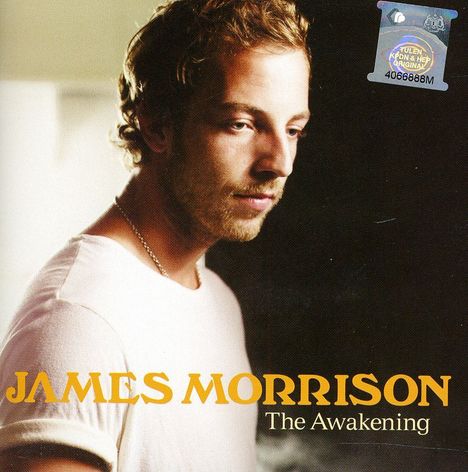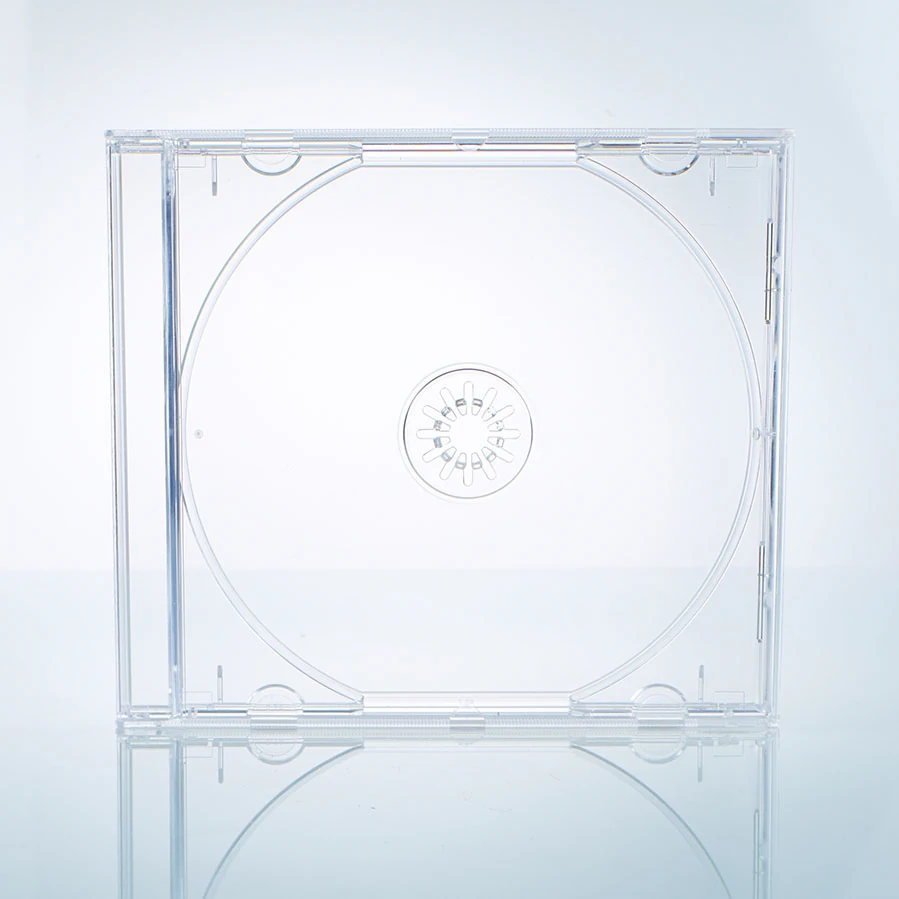James Morrison (Singer/Songwriter): The Awakening (Enhanced) auf CD
The Awakening (Enhanced)
Herkömmliche CD, die mit allen CD-Playern und Computerlaufwerken, aber auch mit den meisten SACD- oder Multiplayern abspielbar ist.
- Label:
- The Island Def Jam Music Group
- Aufnahmejahr ca.:
- 2011
- Artikelnummer:
- 9731877
- UPC/EAN:
- 0602527789446
- Erscheinungstermin:
- 4.10.2011
James Morrison hat bereits mit seinen ersten beiden Alben, die sich weltweit über 4, 5 Millionen Mal verkauft haben, über 30 Mal Gold-, und Platinstatus erreicht. Sein Megahit "Broken Strings" im Duett mit Nelly Furtado beherrschte in Deutschland wochenlang die Airplaycharts und kletterte für 5 Wochen sogar an die Spitze der Media Control Charts.
Nun steht das neue Album "The Awakening" in den Startlöchern. Auch auf dem neuen Album befindet sich wieder eine Kollaboration der Extraklasse: Dieses Mal war Morrison mit Jessie J im Studio, um den Song "Up" aufzunehmen, eines von zwei Stücken, die Mark Taylor produziert hat. Bei allen anderen Stücken saß Bernard Butler hinter den Reglern.
Product Information
As the title of James Morrison’s third and by far best album suggests, The Awakening is the sound of an artist coming of age. In his personal life, Morrison has become a father, while losing his own father after the latter’s long battle with alcoholism and depression. At the same time, Morrison, 26, has matured as a singer, songwriter and musician, enabling him to channel all of that emotion into his most accomplished collection of songs yet. “My first two albums felt like practice shots,” he says, “and now I’ve graduated. In many ways this feels like my first proper album.”
Practice shots they may have been, but those first two albums – Undiscovered (2006) and Songs for You, Truths for Me (2008) – have sold a combined total of 4.5m copies and yielded an astonishing ten singles, including You Give Me Something, Wonderful World, The Pieces Don’t Fit Anymore and the global smash Broken Strings, featuring Nelly Furtado. Those practice shots turned Morrison into an international star.
He has sold out arena tours, gigged coast-to-coast in America as well as in Australia, Japan and across Europe; he has performed on Jimmy Kimmel’s and Jay Leno’s TV shows in the States; sung in front of tens of thousands at London’s Hyde Park supporting both Bruce Springsteen and Stevie Wonder; appeared on Herbie Hancock’s Grammy-winning album The Imagination Project – singing a widely acclaimed cover of Sam Cooke’s A Change Is Gonna Come; he has been voted Best Male at the 2007 Brit Awards; and – at just 21 – was the biggest-selling British male solo artist the year his debut album, Undiscovered, came out.
Everything was new then – co-writing songs, recording professionally, adjusting to being in the public eye. “It was an amazing opportunity, obviously, but at the same time I found it hard living up to being the person that people thought I was. I kept getting: ‘Ahh, James Morrison – he’s so romantic.’ And I didn’t think I was that kind of guy. I wasn’t trying to write songs to get the girls. That’s not me at all! But I loved touring, playing live – that was the side that really made me believe in what I was doing.”
When the time came to record his second album, “I was trying too hard to reconfirm why I was there and why people liked me. And that I could do it again”. And he did do it again: the album’s first single, Broken Strings, has been Morrison’s biggest-selling to date to the tune of 1.5m copies – but he struggled to embrace the experience the way he had two years earlier. Looking back, he feels his second album was too pop, too “lukewarm”, a step in the wrong direction. “I thought, if I can’t get it right next time, then I ain’t doing this any more. I’m losing myself, and I don’t want to do that.”
Fortunately, The Awakening has turned out to be the album that James Morrison always had the potential to make – at last a worthy platform for his extraordinary singing voice. “This time I wasn’t worrying about success at all, and that’s why it was really enjoyable. I didn’t feel I had to go for the big, loud notes all the time – I just sat back and sang how I felt and it all just came flooding out.”
The Awakening is a warm, live-sounding collection of classic but contemporary folk-soul songs. There are musical similarities with Morrison’s debut, but with added panache and self-belief. There are soaring strings, uplifting harmonies, soulful ballads and, in Slave to the Music, a hand-clapping dancefloor groover – a new string to his bow. There are nods to Motown, gospel, country and a hint of Latin. Technically, Morrison remains one of the finest white soul singers, equal parts Stevie Wonder and Paul Young. But he is more than just a Big Voice – he sings from the heart. “To me, pop music is just great music that lasts for years,” he says. “Though there is the other side of pop, which is where you have a hit, but then, after it comes out, it never gets heard again. I never wanted to make that sort of music.”
Three years in the making, the new album is Morrison’s first for Island Records, after moving from Polydor. He has retained the services of regular co-writers including Steve Robson, the man behind Take That’s Shine, Eg White (Duffy), Dan Wilson (Adele); as well as Toby Gad, best known for Beyonce’s If I Were a Boy. Ten of the 12 songs are produced by Bernard Butler – the acclaimed former guitarist in Suede. Butler, who also played guitar on The Awakening and is hailed by Morrison as “the director of the album”, has forged an impressive studio-based career, producing the likes of The Libertines, Tricky and Duffy.
“I was a bit nervous to meet him – his musical background is so different to mine,” Morrison says. “And that created a bit of tension in me to want to please him. So every time I sang I was really going for it, and he kept saying, ‘Chill out – you’re singing too much. Sing it softer.’ But it clicked on the second day, and from then on I knew it was going to be epic ; I was so excited.
“Bernard was really good at keeping the space in the songs and not letting them get too cluttered with production. You can hear everything clearly. Yet he made it sound like a proper record without it being too polished. It was exactly what it needed.
“It was quite a full production, but at its core there were only four of us in the room – drums, bass, Bernard on guitar and me singing. We did seven or eight live takes of each song, picked the best and worked around that. We just made sure the vibe was good, and then whatever you put on top is going to sound great.”
The song Up is another duet with “hit” written all over it. It is one of two songs produced by Mark Taylor, who helmed Broken Strings. Morrison’s vocal partner this time seems an incongruous choice – the potty-mouthed new queen of urban music, Jessie J. Jessie was suggested by his longstanding A&R, Colin Barlow. “Not that I was doubting Jessie’s ability in any way,” Morrison says, “But I was worried whether she was the right character for the song. She got in the booth and did all this stuff that was amazing – she is a ridiculously good singer, so in tune she’s like Autotune . I wanted to tap into the side of her character that is just a normal girl. I was like, you’re a Ferrari, Jessie, you’re in fifth gear – take it down to third. In the end it worked amazingly: she sang the chorus the way I should’ve sung it!”
James’s strained relationship with his father, who died last year from heart failure after a protracted and painful battle with alcoholism, inspired the lyrics for Up – and several other songs on The Awakening. “It’s such a personal song: ‘How can I find you when you’re always hiding from yourself / Playing hide and seek with me until it gets too dark inside your shell / Why do I even try when you take yourself for granted – I should know better by now / And when you call, I can already hear that crashing sound as it all falls down.’
“It was basically me saying to him: ‘I’m not going to put up with your shit, but I want you to know you have got the strength to turn it around for yourself.’ I didn’t explain any of that to Jessie, though – I’d only just met her. We just focused on her delivering a shit-hot vocal.”
Another song, The Person I Should Have Been, evolved out of a poem Morrison wrote after a conversation with his dying father. “He wasn’t very well before he died, and we were talking about things he should have done, or things I should have done. It span me out, and I was like, I need to write about this because I’m going crazy.”
Most raw of all is In My Dreams. “I can hardly hear it because it affects me that much – I don’t know how I’m going to perform it. I was writing with Dan Wilson, and he asked me what I was feeling at the time. I told him that my dad had recently died and I was hoping he would come into my dreams, but he still hadn’t.’ And Dan said, ‘I think you should tap into that,’ and as soon as we had the title In My Dreams I just got a guitar and it all came out. Musically I wanted it to sound like “up”, like Curtis Mayfield or Stevie Wonder. I wanted it to feel like you’re in a dream when you’re hearing it.”
Elsewhere, on the album’s title track, Morrison drew on his own experience of fatherhood. His daughter, Elsie, is now three. “It’s like I’ve just woken up to myself and to what I have to do. I used to say ‘oh, I don’t want kids’ – and then when it happened it was the best thing ever. So I wanted to catch that”. And on the stunning I Won’t Let You Go, on which Morrison’s voice really lets fly, his muse is his long-term girlfriend Gill – about whom he had previously penned songs such as You Give Me Something and, during a rocky patch, The Pieces Don’t Fit Anymore.
The Awakening is full of raw emotion, but these are not “downer songs”, says Morrison. “Yes, some of it’s about dealing with shit – but it’s also about looking at yourself and what you’ve got around you, and weighing stuff up to keep yourself thinking positively. I think a lot of people will be able to relate to that, because that’s what life’s like, what relationships are like.”
That is an outlook that Morrison did his best to adhere to during a childhood that was tougher than many. He was born in Rugby, the middle child of three. After his father left when the children were young, the family moved around the country, bedeviled by debts and the frequent threat of eviction, finally settling the Cornish beach town of Porth when Morrison was 15. He taught himself guitar and learnt to perform live by busking locally – although he failed music A-level at school. “I could hear a note and play it on the piano and get it right every time – but I was crap at the technical side.”
A few years of dead-end jobs followed, reaching a nadir during a spell living in Derby when he was employed as a van washer (“I was 19 and living the life of a 40-year-old.”). But he kept his chin up, and it was while living there and performing at open-mic nights that he took the first steps towards landing the record deal with Polydor that turned his life around.
Those formative years perhaps explain Morrison’s unusual reaction to his own celebrity. “I make a point of going to that extra level in my life to remind myself that I’m normal. Like, I went camping to a Haven holiday park – and I didn’t really want to go, but I thought that if I don’t, it’d be like I was saying I’m too good for that. Like I don’t go to Haven holiday parks, I only go to Hawaii or whatever.”
Inevitably, he got mobbed – while eating sausage and mash with his daughter. “I tried to explain that this was private, family time, but in the end I had to get escorted out by a mate. I ended up sitting on my own in the tent for hours, just so I could finish my dinner! I know I shouldn’t do things like that because I’ll get shit I don’t want – but then if I don’t do it I’m creating a barrier, and I don’t want that either. So I have to keep taking the opportunity to knock it down.”
The bad news for James Morrison is that any future camping trips are likely to result in more undignified scrambles – The Awakening has the potential to send him supernova.
“Yeah, it feels like it’s exactly the right thing at the right time,” he concedes. “I’ve only had a couple of moments like that in my life, but I’ve learnt to recognise them when they come along. And it feels like that’s what’s happening now.”
(jamesmorrisonmusic. com)
Rezensionen
,,Der 26-jährige bedient sich hier kräftig beim Motownsoul (,,6 Weeks"), setzt auf bewährte Gospelmuster (,,Say Something Now") und streut Stücke mit Tanzgarantie ein (,,Slave To The Music"). lt's only Radiofutter, but I like it." (Stereo, Dezember 2011)
,,Die Produktion übernahm größtenteils Bernard Butler, der auch für den Vintage-Soul von Duffy verantwortlich zeichnet. Wie gut das Ergebnis dieser Zusammenarbeit klingt, zeigt schon der Opener ,,In My Dreams", ein Lehrstück in Sachen Blue Eyed Soul." (Audio, Dezember 2011)
,,Auch mit den übrigen zwölf Songs bewegt sich der Brite fast ausschließlich im Midtempo-Bereich, weiß jedoch einen interessanten Spannungsbogen aufzubauen." (Sono, November / Dezember 2011)
Tracklisting
Disk 1 von 1 (CD)
-
1 In my dreams
-
2 6 weeks
-
3 I won´t let you go
-
4 Up (feat. Jessie J)
-
5 Slave to the music
-
6 Person I should have been
-
7 Say something now
-
8 Beautiful life
-
9 Forever
-
10 The awakening
-
11 Right by your side
-
12 One life
-
13 All around the world (bonus track)





